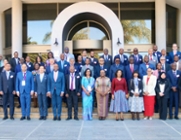Financing net zero at the local level

20 February 2023
Following COP27 much global attention has been focused on financing the transition to net zero.
It is clear that the private sector must play a key role in this and many organisations and partners, including CLGF, are working to explore practical ways in which private finance can be leveraged into cities to support investment in green infrastructure and services. To this end, CLGF commissioned a publication to look at the key issues by Dr Carl Wright, Secretary-General Emeritus of the Commonwealth Local Government Forum.
Local government expertise
The publication is informed by the work of the national local government associations from Rwanda (RALGA), South Africa (SALGA), Jamaica (ALGA), Sri Lanka (FSLGA) and CLGF Pacific including KiLGA (Kiribati) and the Government of Vanuatu, together with advice from ICLEI, PLATFORMA and UCLG.
The EU as a major development partner to local government
Our work towards CHOGM and the need for a greater focus on sustainable urbanisation was an important opportunity to raise this at the Heads of Government level. Alongside the private sector, many development partners are increasingly targeting their development assistance towards strategies to address climate change. The European Union is one of the major development partners working proactively with local government and CLGF is one of five global local government organisations with a Framework Partnership Agreement to look at how we can bring local governments, through their associations, more strategically to the table when assistance is being planned and implemented.
This paper looks at the Green Deal, one of the EU’s key policy priorities in the new NDICI, most notably at the importance of action on climate change at the local level and the core role of cities in adaptation and mitigation; it highlights some of the challenges of access to climate finance at the local level and considers international responses with a focus on the EU and some of the instruments in place. The paper includes some country/regional case studies and it concludes with key actions for local governments that want to engage more with the EU.
The publication is available here.
Back to News





